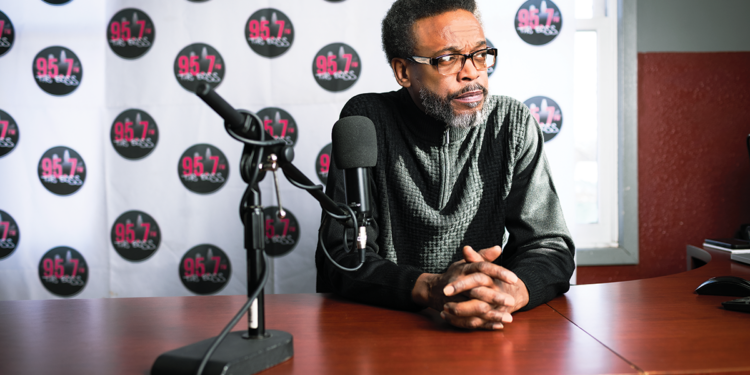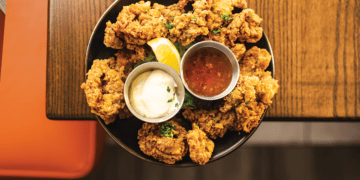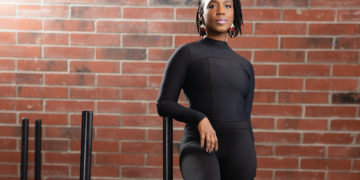Listen to this article here. Audio Provided by Radio Talking Book Service.
Everything that nonprofit Omaha Community Broadcasting and Media King Communications CEO William King Jr. does—from producing-hosting empowering radio shows, to building broadband connectivity—is an extension of his late mother’s teachings.
Everything that nonprofit Omaha Community Broadcasting and Media King Communications CEO William King Jr. does—from producing-hosting empowering radio shows, to building broadband connectivity—is an extension of his late mother’s teachings.
Mary King was raised in a large sharecropping family in Sumner, Mississippi, where Emmett Till was murdered and his killers found innocent in a show trial. She picked cotton as a child. With school not an option, she grew up illiterate.
“Even though my mama couldn’t read or write, her common sense was on a whole other level,” King Jr. said. “Even though she grew up in the harshest racism, she never taught me to hate myself or white folks. She always said ‘life is hard when you make it that way.’ She also said ‘if people treat you good, treat them better’ because you might need them one day.”
Growing up in North Omaha, King took to heart the Golden Rules she imparted, the discipline his military father instilled, and the ‘look out for your neighbors’ ethos his community exhibited.
“We had a community thing where people kept their word,” King Jr. recalled. “We didn’t allow people to be homeless because we did rent parties. We knew our neighbors cared about us because they chastised or disciplined us. The same way at school with our teachers.”
Before gang gun violence, he said, “We handled disagreements. We drew a circle and we fought. We usually became friends.”
The death of two older brothers—one by accidental drowning, and the other in military combat—motivated him to do the right thing by his mother.
“I tried to make great decisions so she wouldn’t lose a third son,” he said.
King built lifelong bonds at the North Omaha Boys Club. North O’s athletic proving grounds helped him grow, but he chose to attend Bryan High School in South Omaha for “a fresh start.” He excelled in the classroom, on the court, and in track and field.
“It was the best decision I ever made,” King Jr. reflected. “Bryan’s teachers and coaches really molded me.”
Attending Midland Lutheran College (now Midland University) also proved life-changing. He became an all-conference basketball and track performer, earning a spot in the school’s hall of fame. In another personal triumph, Midland’s diverse student body broadened King Jr.’s perspective.
“I hung out with my white homeboys and my brother brothers,” King Jr. said. “I met people from Korea and Nigeria. It was eye-opening. A beautiful experience. If there were any problems, I mediated. I’ve always been able to bridge gaps.”
The behavioral science major wielded group psychology to protest the Fremont Tribune—the paper never publishing his photo alongside articles chronicling his athletic achievements despite writing about him for four years. He organized friends and family to pressure the paper, which finally conceded and ran his picture.
“I try to fight things intelligently. If you’re going to beat the system you’ve got to lobby,” King Jr. noted. “Sometimes I agitate, but it’s for a particular purpose.”
After graduation, he worked in a group home and as a Douglas County probation officer. He eased the anxiety Black probationers felt in the criminal justice system.
“It was a good experience,” he said. “The community knew me.”
A colleague helped him establish Positive Havoc—a nonprofit King used to organize basketball camps—with some participants earning college athletic scholarships. The camps expressed a long-held desire, he said, “to help my community by bringing positive change and highlighting goodness.”
He hosted his own public access TV show, “Positive Havoc,” and entered the political arena.
“I knew politics was a way to get what’s necessary.
Politics runs everything,” he said.
His media savvy and community connections led to managing campaigns on behalf of local Democrats—overseeing Mayor Mike Fahey’s impactful North Omaha campaign office during his second run for office. Additionally, King Jr. helped establish the Nebraska Democratic Party Black Caucus.
When King Jr. learned Nebraska Republican Congressman Lee Terry supported national legislation for the local Community Radio Act, he saw an opportunity to create a Black-owned radio station. Despite setbacks, he attained his license in 2014. His broadcast-streaming handles presently include 1690 AM The One and 95.7 FM The Boss.
He recognizes how “the power of words” can give his community its voice.
“If we control our own communication networks, then we can put out information that changes how we view ourselves and the world,” King Jr. said. “Coming from behavioral science, I consider my radio station a research station. Our goal is to modify behaviors, to strengthen families, and encourage people to be better citizens.”
He uses his platform to promote collaboration, Black businesses, and the importance of self-love.
As an urban contemporary station, he said, “We’re closely connected with our community. I have great responsibility to make sure I showcase influencers to bring as much knowledge as possible.”
He offers “constructive criticism” of his community when he sees it falling short of its potential.
His entrepreneurial interests extend to bridging the digital divide in poor rural and urban communities. In 2021, he used CARES Act Remote Access Rural Broadband program monies to build infrastructure on the Macy Indian Reservation. Four new service towers there provide fast wireless speeds, extend WIFI to the school and community center, and provide access to remote learning and telehealth.
He intends to bring enhanced connectivity to more areas where online access can be sketchy.
“My purpose is to develop conduits of opportunity for the next generation,” King Jr. affirmed.
“To make this dream happen,” he said, he’s schooled himself on the technology at conferences and developed relationships with partners. He’s pursuing new partnerships and grants to add staff and reach.
King Jr.’s competitive spirit motivates him to prove naysayers wrong. His friend, Vernon Muhammad, has been with him since the beginning. He’s learned to trust King Jr.’s vision.
“He’s got a very positive drive to bring everything forward. I’m very proud of him,
Muhammad said “It’s been an inspiring journey.”
They envision a community center combining radio, broadband, tech education programs, and mental health services.
Meanwhile, King said, “I want to build capacity to help grow my businesses—and their impact.”
Visit omahabroadcasting.org, mediakingcommunications.com, 957fmtheboss.com, and the 1690am “The ONE” Facebook page for more information
This article originally appeared in the March/April 2023 issue of Omaha Magazine. To subscribe, click here.













